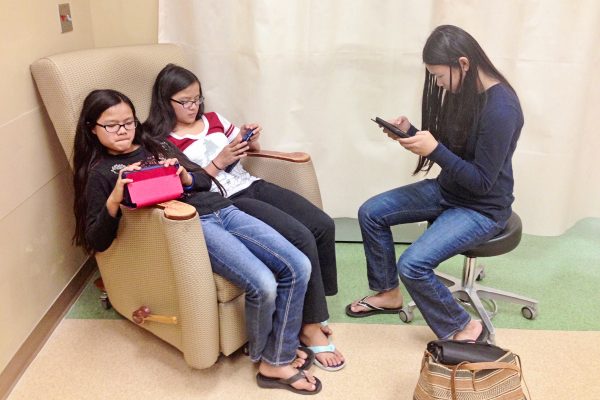Adopting a child with special needs often means that the child will need procedures and/or surgery after adoption. Some of these procedures can wait until the child is more adjusted to life with their new family, speaks English and can voice their opinion. Other procedures are more time sensitive and must be done right away. Either way, these procedures can be anxiety provoking for both child and parent.
Preparing your child as much as possible for the surgery can reduce this anxiety.
This past Monday there were many tears from my 14 year old daughter as we confirmed the date of her next surgery. After this surgery, she will not be able to walk for ten weeks. She is sad, anxious and overwhelmed. This will be the tenth surgery so far for my three children adopted from China. They have also had significant anxiety in their past that still lingers.

Preparing them for surgery has had its medical and emotional challenges. Thankfully, being an adoption pediatrician has given me the opportunity for my colleagues and subspecialist friends to help me along this path. Here are some tips I have learned along the way:
Try to wait 6 months before doing any elective surgeries (surgeries that are not time sensitive). One example of this is circumcision on a newly adopted boy.
After 6 months, your child will have:
— better language
— more secure attachment
— his/her nutritional needs will be better met.
If the surgery or procedure can’t wait… don’t despair.
I have seen many cases were surgery has helped with attachment since the child needed the parent in a very physical/basic way. In this situation you can provide a safe base to which to cling to during hard moments.
Ask the hospital if there is a Child Life specialist available on the day of the procedure. Once my daughter was wheeled back into the surgical suite in a tiny coupe car after doing crafts in the waiting area. She had a big smile on her face!
Ask if they make any special arrangements for children with a history of trauma. Some hospitals will allow you to walk your child back into the OR (not many). Some will let you see your child in recovery as soon as they wake up.
If your child is highly anxious, asking the doctor to premedicate the child with an anti-anxiety medication when they arrive at the hospital for the procedure can be a great help.
Toddler and Preschoolers
• If your child speaks the same language as you, talk with your child 1 (toddlers) – 3 days (preschoolers) prior to surgery. Provide simple, honest answers to your child’s questions, but do not make promises that you will not have control over. Focus on the fact that the surgery will be making them healthier or stronger. Be careful with your wording. Use less threatening words. For example; “make a small opening, “instead of “cut open” or “give you special sleepy medicine” instead of “knock you out.”
• 1-2 days before, consider going to the site where your child will have the procedure and have a fun picnic or treat on campus. Many hospitals will have a “visit the hospital” program that incorporates fun in getting the children emotionally ready for a procedure.
• Remain calm and confident as children pick up on parents’ feelings.
• Buy a toy medical kit for your child to play with and read books about going to the doctor. Take advantange of Doc McStuffins!
• Repeat discussions about surgery to make sure your child understands
• If your child will be asleep during the procedure, focus on what your child will actually see, hear and feel while he is awake before and after surgery rather than the actual procedure.
School-age (6–11 years old)
• Begin talking to your child when the surgery is scheduled. Kids often pick up on more than we think and may misunderstand what they hear.
• Make sure your child knows that he will be in a special sleep during the surgery and will not feel anything.
• Let him or her know what part of her body the doctor is going to fix and why. For example; “the doctor is going to do surgery to fix the hole in your heart so you will feel better and have more energy.”
Teenagers (12 years old and up)
• Offer opportunities for your teen to be involved in surgery questions and decisions.
Older adoptees do not understand the medical system here in the US. This is a good time to explain how surgeries are paid for and how you are choosing the doctor that will perform the surgery (ex. Tell your child about how you asked your pediatrician, asked other parents whose child has the same special need, read about that special need in order to fully understand what questions to ask, made a list of questions, got second opinions). Letting the child in on that process builds trust that you are working hard to make sure the child gets the best care possible and you are their advocate.
• Allow for independence. You can offer some choices such as date of surgery, places you will stay during the procedure, things they will want to take with them the day of the procedure.
• Validate concerns including: anesthesia, privacy and missing friends or school.
• Answer questions honestly.
• If your child may have had previous surgeries in their birth country. Ask what they remember about those surgeries. This could offer new insights into how they feel about hospital procedures and about their history.
Considerations for all ages
• Bring a favorite toy, activity, stuffed animal or blanket. It can go with your child to the operating room and can assist during wait times.
• Children feel secure when you feel secure. Make sure you have all you need to be comfortable during your time at the hospital.
• Make sure that your child’s legal name is the same as his/her name on her insurance policy and the name that he/she is listed under in the hospital system.
• Many surgery offices will pre-certify the surgery with your insurance company. This is not a guarantee, but can help to keep surprise costs at bay.
• If your child will need therapies after the surgery to rehabilitate, be sure to ask your insurance company how many therapy visits they will pay for each year and what the deductible amount is.
• If your child has a complex medical issue that will require travel for care or multiple subspecialists and therapy, you can ask your insurance provider for a case manager to help answer your questions along the way.

Dr. Jennifer Chambers is a board certified general pediatrician with a faculty appointment at the University of Alabama at Birmingham in the division of General Pediatrics and Adolescent Medicine. Besides her clinical and teaching roles at UAB, she is also the founder of the UAB International Adoption Clinic where she evaluates and treats internationally adopted children.
She and her husband adopted twin girls from China when they were infants and, more recently, a now 14 year old also from China. This gives Dr. Chambers the unique personal and professional perspectives of international adoption.

























Hi, I feel for you. I was adopted as well, but when I was six weeks old, from Thailand, however I don’t know my medical background so for that reason a general anesthetic scares me